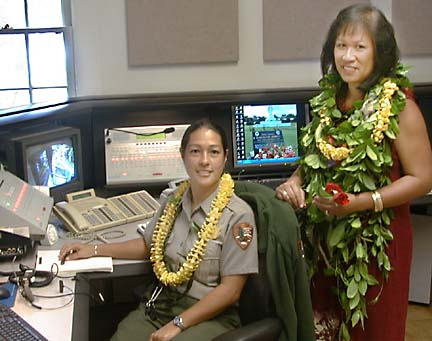

|
Communication center
links isle national parks
The new system will bring faster
response to emergency calls
VOLCANO, Hawaii >> Kaloko-Honokohau National Historical Park ranger Steve Makuakane-Jarrell was on duty alone when he was shot and killed by a mentally ill man in 1999.
In response, the National Park System opened a Pacific Area Communication Center yesterday, providing all-day service linking the seven national parks in Hawaii.
Rangers have long carried radios, said Hawaii Volcanoes National Park chief ranger Paul Ducasse. But until now, no one may have been listening.
The communication center shows that Makuakane-Jarrell's death was not in vain, said Geri Bell, superintendent of Kaloko-Honokohau in West Hawaii.
Opening of the center was a technical achievement, but yesterday's ceremonies at a small former housing unit for employees in Hawaii Volcanoes was a personal gathering of park staff members who view themselves as a family.
"This is a very bittersweet occasion for most of us," said Bell, fighting back tears. Makuakane-Jarrell was "one of the kindest and nicest human beings that was ever put on this earth," she said.
On Dec. 12, 1999, while investigating a complaint about vicious dogs, Makuakane-Jarrell, 47, confronted Eugene Frederick Boyce III, 30, described as an unemployed transient, who had three dogs.
Boyce grabbed Makuakane-Jarrell's semiautomatic pistol and shot him repeatedly, authorities said. He was arrested two days later.
Assistant U.S. Attorney Ken Sorenson said yesterday that Boyce has been judged competent to stand trial for murder, use of a firearm and being a felon with a firearm. At times, Boyce goes off his medication and his mental illness returns, Sorenson said. The degree of Boyce's mental problems at the time of the killing will be the main question when trial begins Feb. 8 in U.S. District Court in Honolulu, he said.
Regarding communications, Ducasse said technological advances made the system affordable at about $300,000. Without the advances, the system would have cost millions, and funding for it would have been unlikely. The system takes radio calls from rangers, relayed by existing repeaters, and puts them into computers, he said.
It then transmits the voice calls as if they were Internet data. The result, for example, for a call from the Arizona Memorial in Honolulu to the dispatch center at Hawaii Volcanoes and back is a fraction of the cost of an interisland telephone call, he said.
Ducasse said better communications will also bring faster help to lost or injured park visitors. He said the next step, hopefully in two years, is a $100,000 upgrade to link the park system to the state 911 system.